
Insects
Scope & Guideline
Pioneering Open Access in Insect Science
Introduction
Aims and Scopes
- Biodiversity and Taxonomy:
The journal emphasizes the documentation and analysis of insect diversity, including the description of new species and the revision of existing taxa, particularly in relation to ecological and evolutionary contexts. - Ecological Interactions:
Research on the ecological roles of insects, including their interactions with plants, other animals, and microorganisms, is a core area, highlighting the importance of insects in ecosystem functioning. - Insect Physiology and Biochemistry:
Papers often focus on physiological adaptations, metabolic processes, and biochemical pathways that insects utilize to survive and thrive in diverse environments. - Insect Behavior and Ecology:
The journal covers studies on insect behavior, including foraging strategies, mating systems, and responses to environmental changes, contributing to our understanding of insect ecology. - Insect Pest Management:
A significant aspect of the journal includes research on integrated pest management strategies, exploring biological control, chemical treatments, and the ecological impacts of pest management practices. - Genomics and Molecular Biology:
The journal publishes studies on the genetic and molecular aspects of insects, including genomic analyses, gene expression studies, and the role of genes in development and resistance to environmental stressors.
Trending and Emerging
- Climate Change and Insect Dynamics:
Recent publications increasingly focus on the effects of climate change on insect populations, distributions, and behaviors, reflecting a growing concern for how global warming impacts biodiversity. - Molecular and Genomic Approaches:
There is a notable trend towards utilizing molecular techniques, including transcriptomics and genomics, to understand insect biology and develop pest management strategies. - Biocontrol and Integrated Pest Management:
Research into biocontrol methods and integrated pest management strategies is expanding, with an emphasis on sustainable practices and ecological impacts. - Insect Microbiome Studies:
The role of gut microbiomes in insect health, nutrition, and pest resistance is gaining attention, leading to a surge in related research articles. - Human-Insect Interactions and Public Health:
The intersection of insect studies with public health, particularly in the context of vector-borne diseases and urban pest management, is increasingly prominent. - Sustainable Agriculture Practices:
Emerging research is focusing on the role of insects in sustainable agriculture, including their contributions to pollination and pest control within agroecosystems.
Declining or Waning
- Traditional Taxonomic Studies:
There has been a noticeable decrease in traditional taxonomic studies focused on insect identification based solely on morphological characteristics, as molecular techniques and genomic approaches gain prominence. - Insect Ecology in Urban Settings:
Research specifically targeting insect ecology in urban environments has diminished, possibly due to increased focus on agricultural and conservation-related studies. - Forensic Entomology:
Although still relevant, the volume of papers dedicated to forensic entomology appears to have waned, suggesting a shift towards more applied ecological and agricultural research. - Insect Physiology Research:
While insect physiology remains a significant area, specific subfields, such as thermal tolerance studies, may be experiencing a decline as attention shifts to broader ecological and evolutionary implications.
Similar Journals

REVISTA COLOMBIANA DE ENTOMOLOGIA
Bridging Knowledge in Insect Ecology and BehaviorREVISTA COLOMBIANA DE ENTOMOLOGIA, published by the SOC COLOMBIANA ENTOMOLOGIA-SOCOLEN, serves as a vital platform for disseminating research in the field of insect science. With an ISSN of 0120-0488, the journal has established itself as a key resource for entomologists, agricultural scientists, and biodiversity researchers, focusing on the ecology, taxonomy, and behavior of insects within the Colombian context and beyond. Despite its Q4 ranking in 2023, REVISTA COLOMBIANA DE ENTOMOLOGIA strives to enhance its impact within the academic community, offering a space for innovative studies and reviews that aim to advance the understanding of insect-related phenomena. As a publication addressing critical concerns in agricultural and biological sciences, it invites contributions that explore new methodologies and findings relevant to the insect world. Although it does not currently offer Open Access options, the journal's growth from 2004 to 2024 reflects its commitment to evolving with the needs of its readership and contributors, making it an essential reference point for students and professionals alike interested in entomological research.
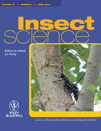
Insect Science
Unveiling the secrets of insect biology and behavior.Insect Science, published by WILEY, stands as a prestigious journal in the realms of Agronomy, Biochemistry, Genetics, and Insect Ecology. The journal, with ISSN 1672-9609 and E-ISSN 1744-7917, has firmly established itself as a significant resource for researchers and professionals seeking to explore the intricate dynamics of insects and their crucial roles in ecosystems. With a remarkable impact factor placing it in the Q1 quartile across multiple categories, including Ecology and Evolution and Agronomy and Crop Science, Insect Science ranks impressively at #8 out of 181 in the realm of Insect Science on Scopus, showcasing its influence and relevance in the field. Spanning its coverage from 1994 to 2024, this journal invites contributions that advance our understanding of insect biology, behavior, and their interactions within agricultural contexts. The commitment to high-quality research and its role in fostering interdisciplinary dialogue make Insect Science an essential platform for scholars and practitioners at the forefront of insect-related studies.
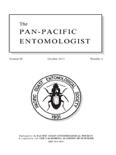
PAN-PACIFIC ENTOMOLOGIST
Empowering Scholars to Transform Insect ResearchPAN-PACIFIC ENTOMOLOGIST, published by the PACIFIC COAST ENTOMOLOGICAL SOCIETY, serves as a pivotal platform for disseminating research in the field of entomology, encompassing a variety of topics related to insects and their interactions within ecosystems. Operating under the ISSN 0031-0603 and E-ISSN 2162-0237, this esteemed journal has been committed to advancing our understanding of insect science since its initial publication in 1993, with coverage extending to 2024. Notably categorized in the Q4 quartile of the insect science category and ranked in the 5th percentile of Scopus, PAN-PACIFIC ENTOMOLOGIST offers a unique opportunity for scholars, professionals, and students to engage with cutting-edge research and contribute to the scientific dialogue within this specialized field. While currently not open access, the journal is dedicated to the dissemination of empirical studies, reviews, and short communications that elucidate the crucial roles insects play in agriculture, ecology, and public health. Situated in the heart of San Francisco, California, this journal not only enriches the academic community but also promotes a deeper appreciation for the diverse and often under-appreciated world of entomology.

CANADIAN ENTOMOLOGIST
Unraveling the Mysteries of the Insect WorldCanadian Entomologist, published by Cambridge University Press, is a prominent journal dedicated to the field of entomology, covering key areas such as insect science, ecology, and evolutionary biology. With its origins dating back to 1868, this esteemed journal has continuously contributed to the understanding of insect behavior, systematics, and physiology, engaging researchers and professionals alike. Although currently not an Open Access journal, it offers valuable insights through its rigorously peer-reviewed articles, reflecting its commitment to scientific excellence. The journal has garnered a respectable Q3 ranking in various categories, including Ecology, Evolution, Behavior, and Systematics, making it a critical resource for scholars and students who seek to explore the complex interactions within insect populations and their environments. Researchers can trust Canadian Entomologist to provide relevant and impactful research that shapes contemporary understanding in the realm of entomological studies, fostering the growth of this vital scientific discipline.
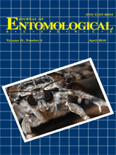
JOURNAL OF ENTOMOLOGICAL SCIENCE
Unraveling the Complexities of Insect LifeJOURNAL OF ENTOMOLOGICAL SCIENCE, published by the Georgia Entomological Society Inc, is a crucial resource in the field of insect science and ecology. With a rich history since its inception in 1993, the journal provides a platform for innovative research and comprehensive reviews addressing various aspects of entomology. Although not an open-access journal, it is highly regarded within its community, holding a Q3 ranking in Agronomy and Crop Science, Ecology, Evolution, Behavior and Systematics, and Insect Science as of 2023. Each issue promises to contribute valuable insights to professionals, researchers, and students alike, making it an essential publication for those looking to stay abreast of developments in entomological studies. The journal's editorial commitment ensures that it remains at the forefront of entomological research through rigorous peer reviews and a dedication to scholarly excellence.

REVISTA DE LA SOCIEDAD ENTOMOLOGICA ARGENTINA
Empowering Researchers with Accessible KnowledgeREVISTA DE LA SOCIEDAD ENTOMOLOGICA ARGENTINA is an esteemed open-access journal dedicated to the field of entomology, published by the SOCIEDAD ENTOMOLOGICA ARGENTINA. Since its transition to open access in 2013, the journal has sought to promote research in insect science, ecology, and related disciplines, facilitating global dissemination of knowledge and encouraging collaborative studies across borders. Located in the vibrant scientific landscape of La Plata, Argentina, the journal is indexed in Scopus and categorized in the fourth quartile of ecology and insect science, reflecting its commitment to enhancing the discourse within these critical fields. Aiming to bridge the gap between researchers, students, and professionals, REVISTA DE LA SOCIEDAD ENTOMOLOGICA ARGENTINA serves as a platform for innovative research, reviews, and reports on ecological interactions, behavior, and systematic entomology, ultimately driving forward our understanding of insect biodiversity and its broader environmental impacts.
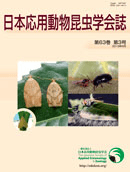
JAPANESE JOURNAL OF APPLIED ENTOMOLOGY AND ZOOLOGY
Exploring the Intricacies of Insect ScienceJapanese Journal of Applied Entomology and Zoology is a premier publication in the field of Insect Science, offering a platform for researchers and practitioners to share their findings on applied entomology and zoology. Established in 1957 and published by the Japan Society of Applied Entomology and Zoology, this journal aims to foster the understanding of insect-related studies that impact agriculture, ecology, and biodiversity. With an ISSN of 0021-4914 and E-ISSN of 1347-6068, it serves as a crucial resource for both academics and industry professionals. While the journal currently resides in the Q4 category of the Scopus ranking for Insect Science with a percentile of 11th, it plays a significant role in providing valuable insights into insect behavior, systematics, and their ecological roles. Readers can benefit from its published research to drive innovations and solutions in pest management and conservation practices. As the journal continues to evolve, it reinforces its commitment to disseminating critical research that supports sustainable practices in entomology and zoology through its convergence extending to the year 2024.
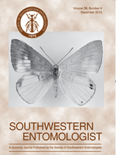
SOUTHWESTERN ENTOMOLOGIST
Exploring the Intersection of Insect Science and AgronomySOUTHWESTERN ENTOMOLOGIST is a pivotal academic journal dedicated to advancing the fields of Agronomy, Ecology, and Insect Science. Published by the SOUTHWESTERN ENTOMOLOGICAL SOC in the United States, this journal plays a crucial role in disseminating vital research findings that address pressing ecological and agricultural challenges. With its ISSN 0147-1724 and E-ISSN 2162-2647, the journal has been publishing comprehensive studies since 1993 and continues to contribute significantly to the knowledge base up to 2024. As a Q4 ranked journal in both Agronomy and Crop Science and Ecology, as well as Insect Science, it provides an inclusive platform for researchers and students to share their insights and foster collaborations. Although it currently does not offer open access options, the content is accessible to academic institutions and professionals, ensuring that significant findings reach a broad audience. Given its niche focus, SOUTHWESTERN ENTOMOLOGIST not only appeals to researchers and students but also to professionals looking to stay updated on the latest trends and developments in entomology and its related fields.

BULLETIN OF INSECTOLOGY
Advancing Insect Science for a Sustainable FutureBULLETIN OF INSECTOLOGY is a prominent academic journal published by ALMA MATER STUDIORUM, UNIV BOLOGNA, Italy, specializing in the field of Insect Science. The journal, with ISSN 1721-8861 and E-ISSN 2283-0332, has established itself as a vital resource for researchers and professionals interested in the diverse aspects of entomology and its applications. It ranks in the Q2 category for Insect Science as of 2023, placing it among the top journals in its field with a Scopus rank of 79 out of 181. The BULLETIN OF INSECTOLOGY is committed to disseminating high-quality research and innovative studies, facilitating open dialogue and collaboration among scientists. As an essential platform for sharing groundbreaking findings, it contributes significantly to the body of knowledge in agricultural and biological sciences, making it an invaluable asset for scholars and practitioners alike. With coverage from 2002 to 2024, this journal continues to foster advancements in entomological research and its importance in tackling environmental challenges.

APPLIED ENTOMOLOGY AND ZOOLOGY
Connecting science and sustainability in applied entomology.Applied Entomology and Zoology, published by Springer Japan KK, is a pivotal journal in the field of insect science, with an impressive track record since its inception in 1966. This esteemed publication, bearing ISSN 0003-6862 and E-ISSN 1347-605X, contributes significantly to the understanding of applied entomology, emphasizing research that supports sustainable agricultural practices and the ecological conservation of insects. Ranked in the Q2 category (2023) for Insect Science with a Scopus rank of #65 out of 181, it is recognized for its rigorous peer-review process and high-quality contributions that push the boundaries of our knowledge. Although it does not currently offer open access, the journal remains an essential resource for researchers, professionals, and students eager to advance their understanding of the complex interactions between insects and their environment. With a focus on practical applications, it aims to bridge the gap between entomological research and real-world implications, fostering innovation and promoting informed decision-making within the scientific community.